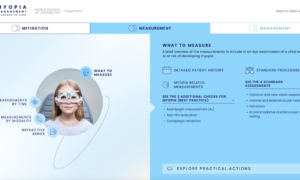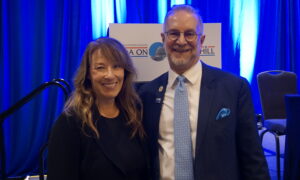December 1, 2023
By Vaughn Brinegar, OD
Myopia management allows you to really get to know your patients and their personalities because of the nature of care we provide with this modality. We build a rapport that we aren’t usually able to do by just seeing a patient once a year.

PhotoAlto/Odilon Dimier, Getty Images
In the past few years, myopia management has exploded in our practice. With that, we have encountered a lot of new personalities in our exam chairs, and we have learned that myopia management should be personalized to each child because there is no formula that is one size fits all. Considering the child’s personality is paramount for achieving myopia management success.
Age Plays a Role
Age is a crucial factor when initiating myopia management. The mere thought can be quite intimidating if a child is very young and the parents have no experience with contact lenses. Thankfully, we have low-dose atropine, ideally suited for patients who are too young or too opposed to wearing contact lenses. As a practitioner, you can generally feel this patient out — sometimes, they will scream or cry at the thought of contact lenses. Mom and Dad will look as though you have just told them they will need to perform surgery on their child before bed each night. If parents or children are overly anxious, atropine can be a wonderful stepping stone toward daytime or nighttime lenses when the patient is ready. An added benefit is that patients who are used to instilling drops make much better students to train in the application of lenses.
Home and Lifestyle Can Affect Treatment
If contact lenses are a new concept to a family, be prepared to hold their hand with any visits related to training and follow-up. Videos and written material are nice to fall back on, and I give parents my cell phone number so they can ask questions anytime. It is essential to be available, as this can be a scary and daunting time for parents if they have no experience with lens wear and care. FaceTime is wonderful — I have been able to answer questions in the evening and guide parents regarding lens application without having to make a trip to the office.
Lifestyle factors should be considered as well. Is your patient active in sports? I love to tell parents how many kids I have seen light up after wearing contact lenses for the first time or score a goal on the soccer field when they no longer have to worry about their glasses sliding down their nose. My son loved his glasses and didn’t want to wear contacts, but he couldn’t deny running faster and playing better without his peripheral vision being impeded by his frames. Swimmers and football players also appreciate the freedom nighttime lenses provide.
On the flip side, sometimes patients will prove to be poor candidates for nighttime wear based on their lifestyle. Will they get enough sleep at night to ensure good daytime vision? This critical question needs to be addressed with teens, as they tend to stay up later than younger patients. It is imperative to know if your teen patient is driving. Make sure to ask if they skip wearing their lenses, and if this happens frequently, consider checking their vision on a day when they haven’t worn their lenses. This can help make sure their vision is acceptable, and you have the opportunity to offer a supplemental pair of glasses for these occasions.
A Full Myopia Management Toolkit Allows You to Reach All Patients
If your patient is skipping their nighttime lenses often, it is a good idea to have other modalities to recommend. Daytime contact lenses are an excellent option in our myopia management toolkit because everyone generally knows about them, and parents typically respond well to the fact that there is FDA approval. Of course, we also have a nighttime lens with the same indication, and hopefully, low-dose atropine will soon follow. This can be very comforting to parents. However, I tend to tell them that my goal is to provide excellent vision and comfort and design a lens that is best for the patient — exactly how I would for my children. I may need to use an off-label design due to the child’s prescription or how the lens feels on the patient’s eye. In my area, allergies and dry eye are concerns. We address that first and then decide if a daytime or nighttime lens will be the most appropriate for them.
Many parents love the idea that nighttime lenses never leave the house, and they can control their child’s lens-wearing experience. They like the idea of not having to worry about daytime lenses when their child is at school. If a patient does not appear to be a candidate for nighttime lenses, I reassure them that we will train their child to be completely comfortable with lens wear and care. We get many referrals from happy patients who love the freedom nighttime lenses provide. Sometimes, however, a patient may not be the best candidate if we cannot get reliable baseline topography or their prescription is not ideal for orthokeratology. This is why it is nice to be able to pivot and let parents know you have many options and combinations to ensure their child gets the very best care. Although they may start in one modality, they may need to change as time passes, which is okay.
Myopia management allows you to really get to know your patients and their personalities because of the nature of care we provide with this modality. We see these kids and their families more often throughout the year to ensure their prescriptions are stable and their lenses fit well. We build a rapport that we aren’t usually able to do by just seeing a patient once a year. This type of interaction attracted me to optometry — building relationships within my community. I love my job. What an exciting time to be an optometrist!
 |
Vaughn Brinegar, OD, graduated from Southern College of Optometry in 2003. She has been in private practice with her sister, Victoria DeFeo, OD, at Ultimate Eye Care since May 2005 in Austin, Texas. Their office is in a suburban location with a lot of young families, so they emphasize myopia management. You can contact Dr. Brinegar at vbrinegar@ultimateeyecare.com
|













